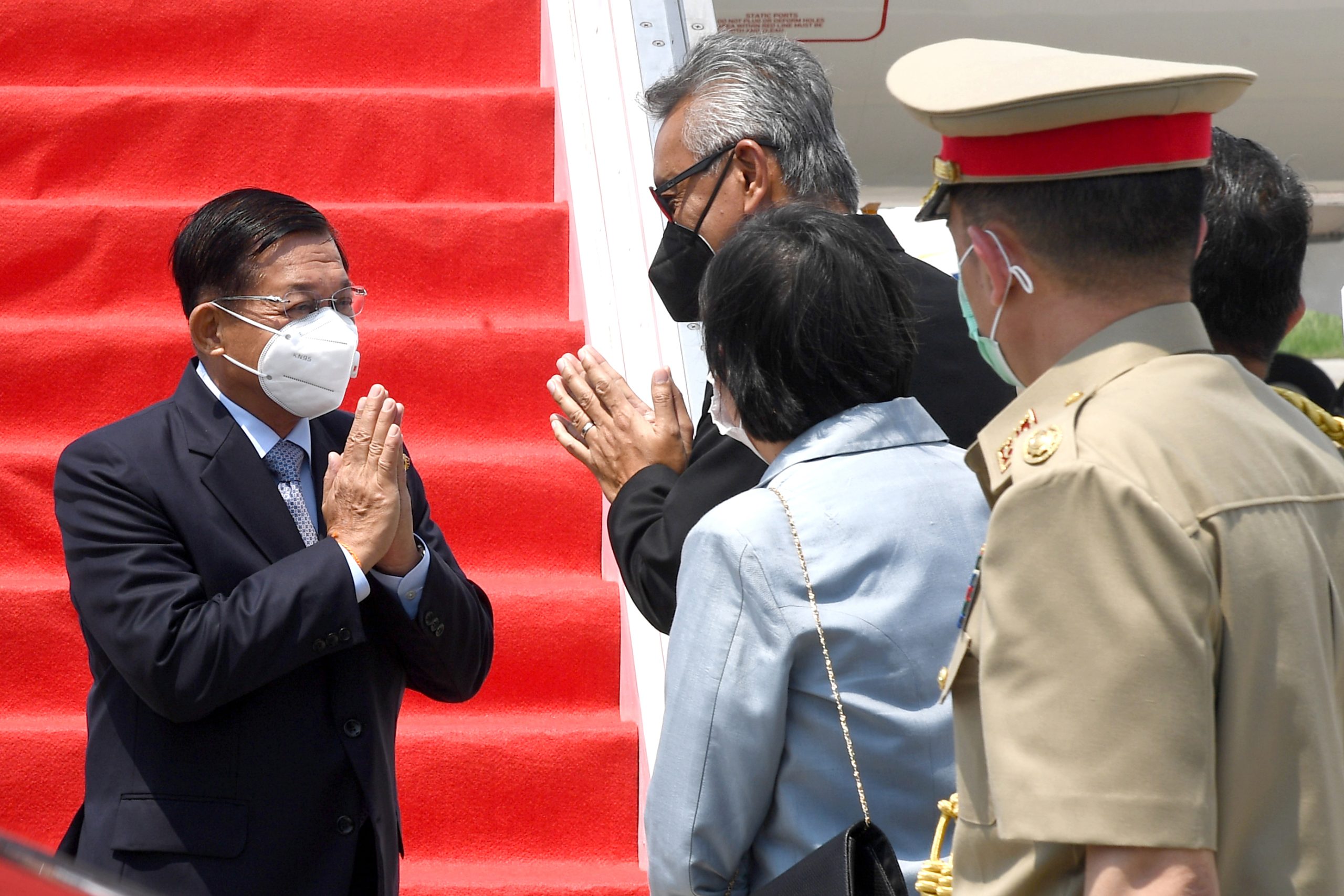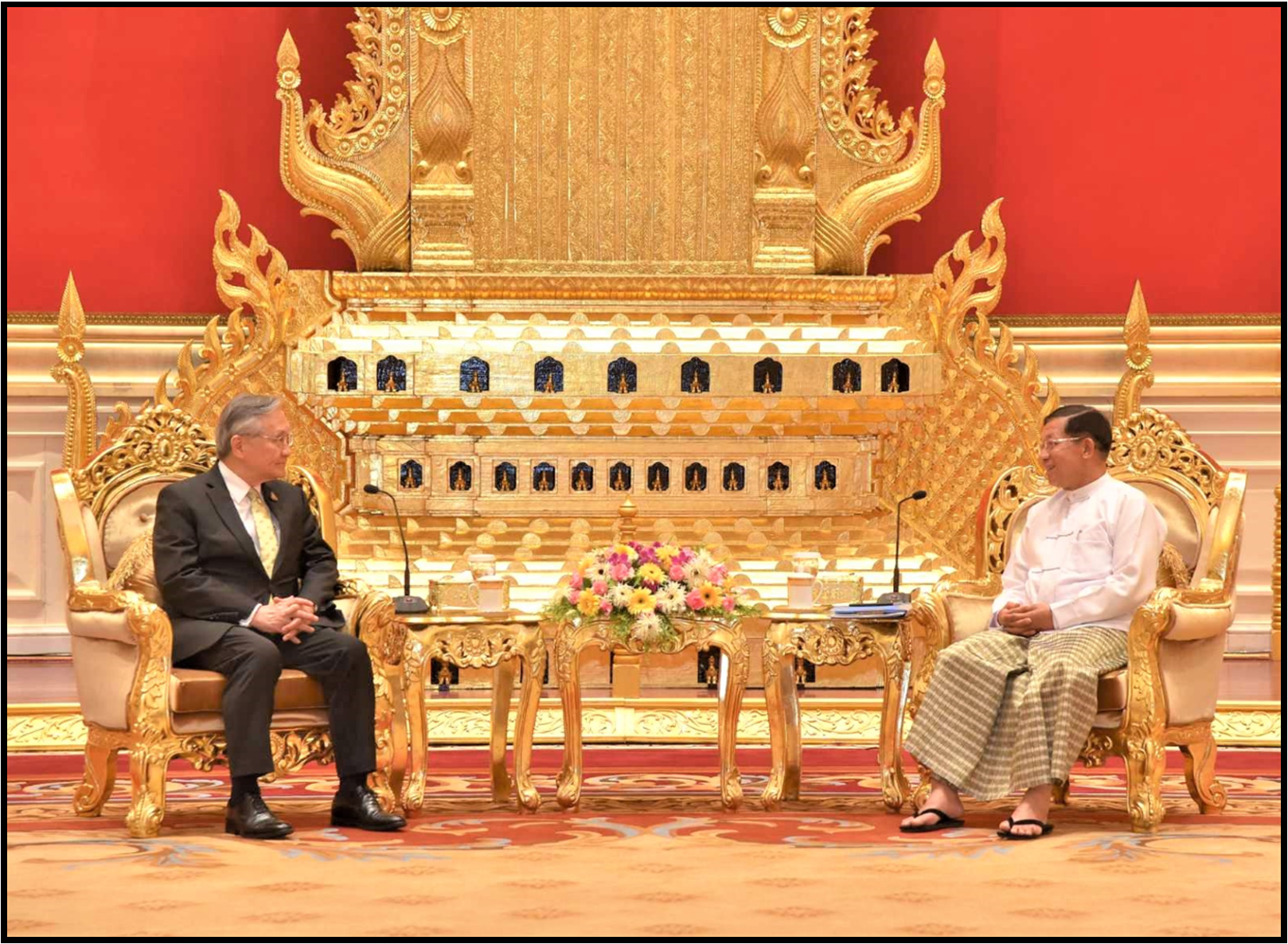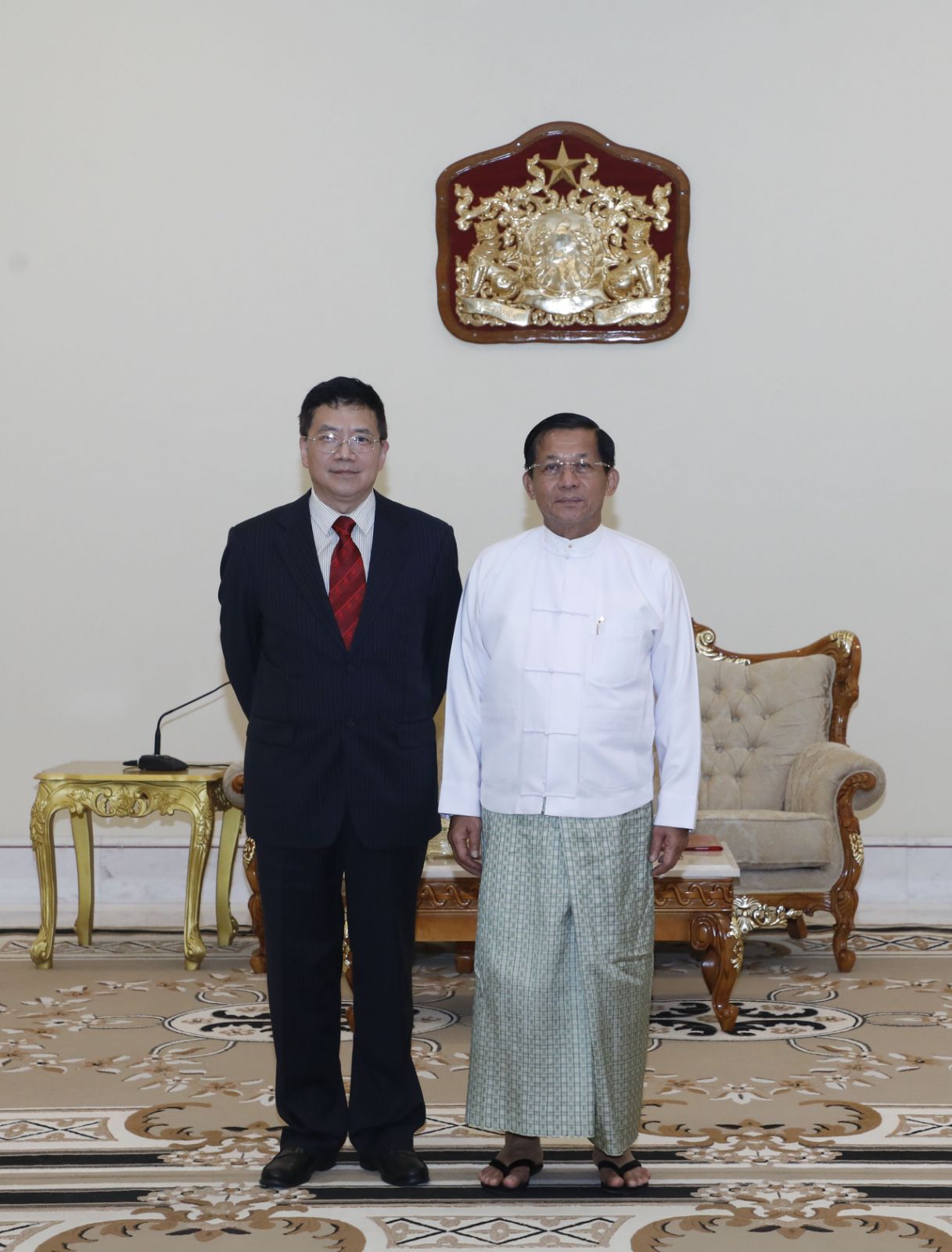Two-and-a-half years after Senior General Min Aung Hlaing sent his tanks into Yangon and Naypyitaw, the question is not what Myanmar’s partners in the Association of Southeast Asian Nations (ASEAN) can do about the attempted power grab, but whether the regional grouping can survive its present crisis. Critics would argue that ASEAN, once again, has revealed its weak spots and slid from political impotence to regional irrelevance. All signs indicate that China has seized the initiative and further strengthened its position as the West, usually a force to be reckoned with when it comes to putting pressure on Myanmar’s ruling generals, is preoccupied with Russia’s war against Ukraine.

ASEAN’s first, feeble attempt at addressing Min Aung Hlaing’s ill-fated power grab came on April 24, 2021, when he and leaders of the nine other member states met in Jakarta and agreed on a “five-point consensus” that called for an immediate cessation of violence as well as a “constructive dialog” among “all parties concerned”. The word “consensus” was carefully chosen because it is one of ASEAN’s two cardinal principles, the other being “non-interference”. In effect, that means that the bloc cannot take any affirmative action against any of its members in times of crises or intervene in a conflict between member states. Since its founding in 1967, ASEAN has experienced numerous such instances—Indonesia’s brutal invasion of East Timor in 1975, continuous border disputes between Thailand and Laos, Cambodia and Vietnam, and Malaysia and the Philippines, cross-border insurgency involving Thailand and Malaysia, and even a series of border clashes between Thailand and Cambodia from 2008-11, just to mention a few. The bloc did and has done nothing to solve any of those problems and conflicts.
Not surprisingly, therefore, Min Aung Hlaing felt he could ignore the “consensus” and continue his bloody campaign against the resistance to his junta, the so-called State Administration Council (SAC). Meanwhile, anti-coup demonstrators burned the ASEAN flag in the streets of Yangon and Mandalay, accusing the bloc of lacking credibility and giving legitimacy to military rule. Emissaries sent by ASEAN to Myanmar were not allowed to meet Daw Aung San Suu Kyi, the imprisoned de facto head of the government that was ousted in the February 2021 coup, nor were envoys from the United Nations and members of her own legal team.
But then, suddenly and unexpectedly, Thai Foreign Minister Don Pramudwinai met Daw Aung San Suu Kyi in an annex to the prison in Naypyitaw on June 11. The meeting supposedly lasted “for over an hour”, according to what he said afterwards. Don also met Min Aung Hlaing, and, on the sidelines of a subsequent foreign ministerial meeting in Jakarta, briefed representatives of other ASEAN member states of his one-day visit to Naypyitaw. Don also told reporters that Daw Aung San Suu Kyi “encourages dialog without any preconditions”, but did not go into details.

How and by whom Don’s trip had been arranged is not clear. He claimed only vaguely that all sides had agreed to it, as if he had been in touch with Daw Aung San Suu Kyi before he went to Naypyitaw. An indication of what could have happened behind the scenes came when Deng Xijun, China’s special envoy for Myanmar affairs, visited Myanmar at the end of July. Although it has not been officially confirmed, it is believed that Deng also met Daw Aung San Suu Kyi who by then had been transferred from her prison cell to a more comfortable state-owned venue in the capital. At the same time, the junta announced a partial pardon for Daw Aung San Suu Kyi, which some outside observers hailed as a “step forward” and even, as Don did, calling it a “breakthrough”. But it was lost on many that the pardon was, at most, symbolic. Daw Aung San Suu Kyi, who had been sentenced to a total of 33 years in prison, was granted clemency for five of the 19 offenses for which she was tried, and only for the minor ones. That means that the 78-year-old pro-democracy leader still has 27 years to serve.
The meetings in Naypyitaw prompted Malaysia as well as the Philippines to say that there should be room for fellow ASEAN states and individuals to pursue their own approaches for dealing with the Myanmar crisis. In other words, ASEAN as a bloc has become redundant. Indonesian President Joko Widodo said on Aug. 8 that the bloc, including Myanmar, must continue to work together to solve the crisis: “ASEAN, as a big ship, must move forward. This big ship must continue to sail. This big ship cannot sink because this is our responsibility to hundreds of millions of people inside.” But the bloc has already sunk. According to inside sources, it was China that laid the groundwork for Don’s meetings in Naypyitaw, and Deng’s visit about a month later was a follow-up to confirm Beijing’s position as the main player on the Myanmar chessboard. With the West now paying little or no attention to Myanmar, China is indeed even becoming the only game in town.
That does not bode well for Myanmar, and it was anyway rather foolish of some—among them former Australian prime minister and now ambassador to the United States, Kevin Rudd—to expect ASEAN to be a promoter of democracy. In a BBC interview two weeks after the coup, Rudd, then with the Asia Society, said the way forward should be a dialog with the coup makers under “guidance of ASEAN.” The European Union (EU), which has imposed sanctions on the coup makers, said in a statement on April 30, 2021 that it “stands ready to support ASEAN, its Chair, its Secretary General and the Special Envoy in facilitating a constructive dialogue with all key stakeholders with a view to bringing Myanmar/Burma back to its democratic path.”
It is too often forgotten that ASEAN is a gathering of mostly undemocratic regimes. Vietnam and Laos are communist party-ruled dictatorships and Cambodia is governed by an autocratic regime that has shown no interest in adhering to democratic principles. The ruling Cambodian People’s Party won a landslide victory in elections in July, which the US State Department, regional pro-democracy parliamentarians and the UN High Commissioner for Human Rights among others described as neither free nor fair. Brunei is an absolute monarchy. Malaysia has wavered between oppression of dissidents and periods of more openness, Singapore is not known for respect of dissident views, and, in Thailand, the military has staged several coups against democratically elected governments. An election was held in May, but the unelected, military-appointed upper house, or Senate, made sure that the largest, pro-democracy party was not able to form a government.
The Philippines has democratic institutions but is ridden by corruption and its former president, Rodrigo Duterte, is accused by the chief prosecutor of The Hague-based International Criminal Court of crimes against humanity during a deadly drugs crackdown. Several thousand suspected drug users and dealers were killed in extrajudicial executions after he assumed the presidency in 2016, many of them urban poor and youths who were believed to be innocent. And then, of course, there is Myanmar. Of ASEAN’s 10 members, only the current chair Indonesia could be regarded as a stable, reasonably democratic country. Consequently, Indonesia has been called upon by international bodies, including the United Nations, to show leadership in resolving the crisis in Myanmar. But progress has been non-existent because of the rules that stipulate what ASEAN can and cannot do.
Meanwhile in August, East Timor Prime Minister Xanana Gusmao stated that his country would reconsider its goal of applying to become the 11th member of ASEAN if the bloc is unable to find a resolution to the conflict in Myanmar. Referring to his country by its Portuguese-language name, he added that, “as a country that had adopted democracy, Timor Leste could not accept military junta regimes anywhere and could not ignore human rights violations in Myanmar.” A month before that, East Timor President José Ramos-Horta had met Daw Zin Mar Aung, the foreign minister of Myanmar’s shadow civilian National Unity Government in the capital Dili and asked world leaders why they were not helping Myanmar the way they are helping Ukraine.
The chairmanship of ASEAN rotates annually based on the alphabetical order of the English names of member states, which means that it will be Laos’ turn in 2024. Laos is hardly known for a proactive approach to foreign policy—and it is heavily dependent on China, which has invested in infrastructure projects such as a high-speed railroad connecting the two countries, hydropower dams and special economic zones (SEZ). Laos has, to some extent, managed to balance China’s influence with economic and diplomatic ties with Vietnam and Thailand. But China would certainly have much more leverage over Lao foreign policy than it does over current chair Indonesia.

Myanmar’s fiercely nationalistic military tried for years to lessen its dependence on China, first by entering into defense relations with Russia and even North Korea and, after the 2010 election, by pursuing a policy aimed at establishing an entirely new relationship with the West that entailed opening up the country and allowing unprecedented political freedoms. All that changed after Min Aung Hlaing’s 2021 attempt at seizing power. Relations with Russia are closer than ever and the junta has reportedly re-established some degree of cooperation with North Korea. But, in the end and whether the generals want it or not, Min Aung Hlaing’s junta has had to go back to China and beg for support in order to survive.
But that also comes at a heavy price. The Irrawaddy reported on Aug. 22 that China has been pouring billions into Myanmar to prop up the junta, accounting for 23.5 percent of total foreign investment. But it is worth noting that nearly all of it goes to hydroelectric power development—of which China will be the main beneficiary, in terms of the electricity generated—and to the construction of railroads and other infrastructure projects that will tie Myanmar even closer to China. That means money in the pockets of the military and very little that would improve living conditions of ordinary Myanmar citizens. With ASEAN out of the picture and the entire future of the bloc in jeopardy because of its inability to handle the Myanmar crisis, China is securing its place as the dominant power not only in Myanmar but in Southeast Asia as a whole. When the West wakes up to that fact, possibly after the war in Ukraine is over, it may be too late. And it will be more difficult than ever to fulfill the dream of a democratic, federal Myanmar.

















